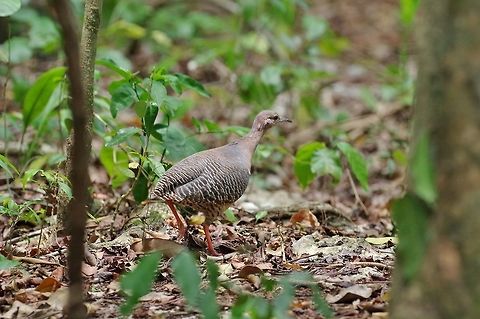
Appearance
The thicket tinamou is 27 to 29 cm in length and weighs 440 g . Its upper parts are brown, heavily barred blackish on back, rump and wings. Its lowerparts pale brown, cinnamon on breast, greyer on belly and undertail whitish with dark barring. Its head brown with prominent buff supercilium and well-defined ear covert patch with bill brownish and legs red in color.Naming
The thicket tinamou has many subspecies as follows:⤷ ''C. c. cinnamomeus'' occurs in coastal southeastern Mexico State, El Salvador, Guatemala, and Honduras.
⤷ ''C. c. occidentalis'' occurs on the coastal western Mexico; Sinaloa, Nayarit, Jalisco, Colima, Michoacán, and Guerrero States.
⤷ ''C. c. mexicanus'' occurs in coastal northeastern Mexico; Tamaulipas, northern Veracruz, and Puebla States.
⤷ ''C. c. sallaei'' occurs in southern Mexico; Puebla, Chiapas, Oaxaca, and southern Veracruz States.
⤷ ''C. c. goldmani'' occurs in southeastern Mexico, on the Yucatan Peninsula; Yucatán, Quintana Roo, Campeche, and eastern Tabasco States, northern Petén Department, Guatemala, and northern Belize.
⤷ ''C. c. soconuscensis'' occurs on the Pacific slope of Chiapas and Oaxaca States, Mexico.
⤷ ''C. c. vicinior'' occurs in the highlands of Chiapas State, Mexico, Guatemala, and western Honduras.
⤷ ''C. c. delattrii'' occurs in the Pacific lowlands of Nicaragua; Chinandega, León, Managua, Carazo, Masaya, Granada, and Rivas Departments.
⤷ ''C. c. praepes'' occurs in the lowlands of northwestern Costa Rica; Guanacaste, and northern Puntarenas Provinces.''Crypturellus'' is formed from three Latin or Greek words. ''kruptos '' meaning covered or hidden, ''oura'' meaning tail, and ''ellus'' meaning diminutive. Therefore, ''Crypturellus'' means small hidden tail.
Status
The IUCN lists this bird as Least Concern, with an occurrence range of 600,000 km2 .Behavior
The species has a monotonous voice ‘whoo-oo’, sounding like a steam engine. The thicket tinamou can be found in pairs, families or as a solitary bird and, like most tinamous, it prefers to walk than fly.Habitat
This species prefers moist lowland forest, gallery forest, deciduous forest, and secondary forest in subtropical and tropical regions, but will be found in shrubland and drier forests up to 1,850 m altitude.Reproduction
Like most tinamous, it will place its nest on the ground alongside raised roots. It will contain around three eggs, but as many as seven, that are glossy and purple in color. This species and the slaty-breasted tinamou will produce hybrids.Food
Like most tinamous, it will eat fruit, seeds and invertebrates.References:
Some text fragments are auto parsed from Wikipedia.